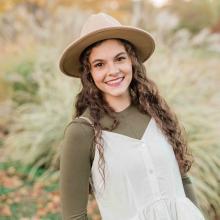Why did you decide to choose developmental science as a course of study or career?
I chose this path because I want all children to feel safe and loved and have ample opportunities for healthy development regardless of where they were born. Children thrive when their families are also thriving, so it is important to me to support parents and whole family systems as well. I was inspired to study play because it is an essentially boundless, low-cost way to support multidimensional development across the lifespan. We could all use a bit more play in our lives!
Is there a mentor or mentors who have been instrumental to your studies and career path so far, and, if so, who and how?
Definitely! The journey to a Ph.D. is filled with so many different mentoring relationships. Two of my primary mentors have been my undergraduate advisor, Dr. Ansley Gilpin, and my graduate advisor, Dr. Rachel Thibodeau-Nielsen. Both have been so supportive as I've navigated the exciting and challenging process that is graduate school. They have both supported me in pursuing my own career goals outside of their labs, listened genuinely to issues, and helped me devise solutions. Within SOGIE, I look up to all the Caucus leaders, especially Drs. Toomey and Bishop. While not formal mentors, they have each been so willing to give valuable advice and share any knowledge they have.
What advice would you give to a prospective graduate student thinking about beginning their Ph.D. studies in the developmental science field?
First, think deeply about your 'why'. What is the reason you are pursuing this degree? When you center around your values and goals, it makes it easier to shoulder the challenges that will be inevitable in graduate school and it clarifies tough decisions about opportunities, both because you're thinking more long-term. Second, create intentional spaces, times, or social circles that remind you of your life outside of graduate school. It is easy to get caught up in the endless work and forget you are a whole person, not just a graduate student. Being intentional about taking physical and mental breaks will help prevent burnout and imposter syndrome - you are more than your degree!
What is your best SRCD memory?
My first SOGIE caucus meeting at the SRCD Biennial Meeting in Salt Lake City, Utah! It was my first time being at a large, in-person conference, and I felt so inspired to be in a room full of scholars committed to SOGIE topics. I was struggling to find colleagues that had lived or studied LGBTQ+ experiences, and it was so refreshing to feel that community instantly. The comraderies in the room was practically tangible, and I felt lucky to be joining in.
Why did you join the SOGIE Caucus and how does it facilitate connection among members all year long?
I wanted to find a space for academic mentorship around LGBTQ+ research. Studying gender identity development in early childhood carries unique obstacles, especially without expert mentorship. Luckily, SOGIE Caucus does a tremendous job facilitating connection at and in between conference meetings. There is regular email communication, frequent meetings on various topics both academic and personal, intentional mentorship pairings, and a general welcoming and supportive environment. Even though I didn't know a single Caucus member when I joined, I quickly felt connected and valued in this space.
